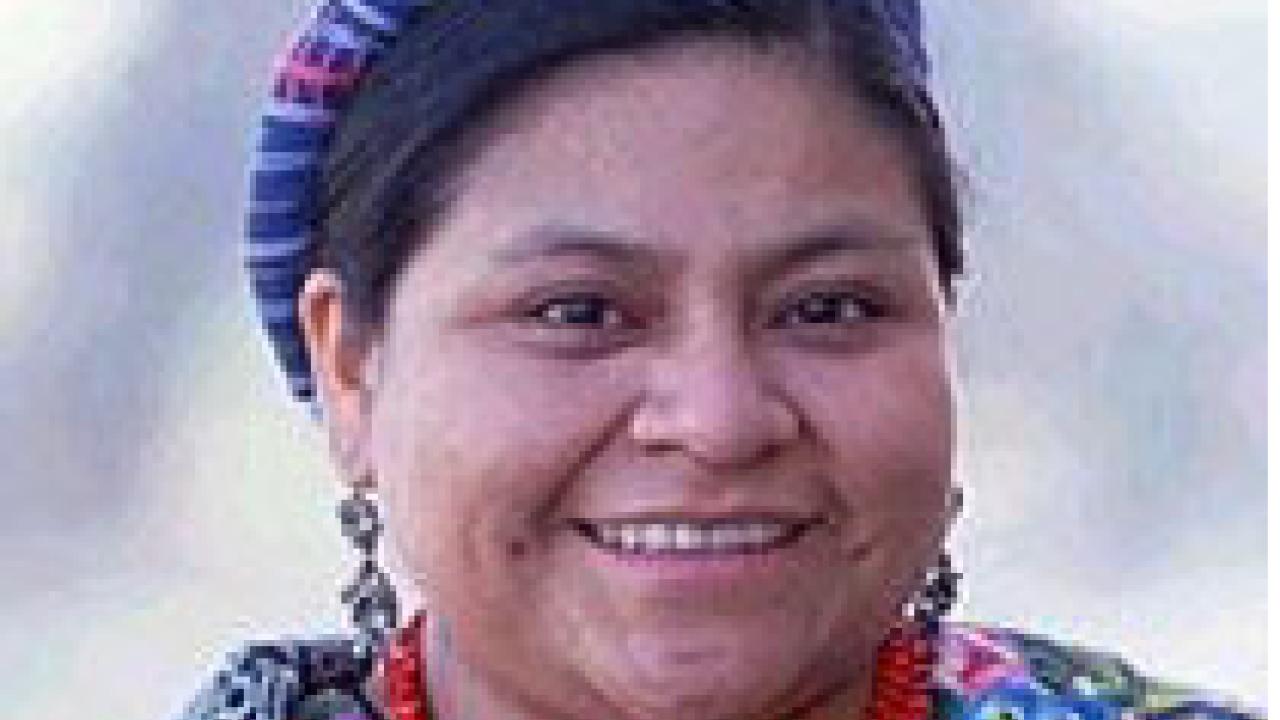Nobel Peace Laureate Rigoberta Menchú, a Guatemalan activist, will speak on "Human Rights and Indigenous Peoples" in Mondavi Center's Jackson Hall at UC Davis at 8 p.m. Friday, Oct. 21.
Awarded the Nobel Peace Prize in 1992, the year of the 500th anniversary of Columbus' first voyage to the New World, Menchú is considered one of today's premier spokespeople for human rights, Latin Americans, indigenous peoples and women.
Menchú takes indigenous peoples' ancestral spirituality as a source of wisdom, interpretation, inspiration and energy. As a survivor of genocide in Guatemala, she seeks the observance of a code of ethics for an era of peace as her contribution to humanity.
"There is no peace without justice, no justice without equality, no equality without development, no development without democracy, no democracy without respect to the identity and dignity of cultures and peoples," she has said.
"Although we are especially interested in reaching people with interests in or personal roots in Central America, Rigoberta Menchú's message is one that everyone should hear," said Thomas Holloway, director of the UC Davis Hemispheric Institute on the Americas. "We also want to reach young people -- those for whom 1992 was a long time ago."
Best known in the U.S. for her 1984 autobiography "I, Rigoberta Menchú, an Indian Woman in Guatemala," Menchú was born in 1959 and spent her early years in a remote village in the Guatemalan highlands.
In addition to her work as head of her namesake foundation, Menchú since January 2004 has held the position of Good Will Ambassador for the Peace Accords in Guatemala, in the administration of President Oscar Berger.
She started as a social activist at age 11, in a Catholic organization called the Daughters of Mary. Through the 1970s and '80s, Menchú continued her social and political activities on behalf of indigenous peoples, even as most of her family died in the political violence that plagued Guatemala in that era.
Soon after Menchú first became involved in social reform activities through the Catholic Church as a teenager, she became prominent in the women's rights movement. Such reform work aroused considerable opposition in influential circles, especially after a guerrilla organization established itself in the area.
The Menchú family was accused of taking part in guerrilla activities, and Rigoberta's father, Vicente, was imprisoned and tortured for allegedly having participated in the execution of a local plantation owner. After his release, he joined the recently founded Committee of the Peasant Union.
In 1979, Rigoberta, too, joined the union. That same year, the army arrested, tortured and killed her brother. The following year, security forces in the capital killed her father when they stormed the Spanish Embassy where he and some other peasants were staying. Shortly afterward, her mother also died after having been arrested, tortured and raped.
Menchú figured prominently in a 1980 strike that the union organized for better conditions for farmworkers on the Pacific Coast and, on May 1, 1981, she participated in large demonstrations in the capital. She joined the radical 31st of January Popular Front. She contributed by educating the Indian peasant population in resistance to massive military oppression.
In 1981, Menchú went into hiding in Guatemala and then fled to Mexico. That marked the beginning of a new phase in her life: as the organizer abroad of resistance to oppression in Guatemala and the struggle for Indian peasant peoples' rights.
Menchú became a member of the National Coordinating Committee of the Committee of the Peasant Union in 1986, and the following year she performed as the narrator in a film, "When the Mountains Tremble," about the struggles and sufferings of the Maya people. On at least three occasions she returned to Guatemala to plead the cause of the Indian peasants, but death threats forced her to return to exile.
Since she was awarded the Nobel Peace Prize, Menchú has become widely known as a leading advocate of Indian rights and ethno-cultural reconciliation, not only in Guatemala but also in the Western Hemisphere, and her work has earned her several international awards.
She also started the Rigoberta Menchú Tum Foundation with the cash award that accompanied the Nobel Peace Price. In Guatemala, the foundation carries out projects directed at education, health care, and human rights, with an emphasis on citizens' civil rights. Menchú's group is also aiding the return of indigenous Guatemalans exiled since the early 1980s in southeast Mexico.
Menchú's visit to UC Davis is sponsored by the Hemispheric Institute on the Americas and a number of UC Davis units concerned with human rights and Latin American issues.
Tickets cost $10 for general admission, and $5 for students and those under 18.
They can be purchased on the Web at http://www.mondaviarts.org (go to the calendar for October and click on "Speaker" in the Oct. 21 box), by e-mail through tickets@ucdavis.edu, and by telephone, 530-754-ARTS.
Updates on this event will be posted at http://hia.ucdavis.edu/hianotices.htm.
Media Resources
Susanne Rockwell, Web and new media editor, (530) 752-2542, sgrockwell@ucdavis.edu
Thomas Holloway, Hemispheric Institute on the Americas, (530) 754-9453, thholloway@ucdavis.edu
